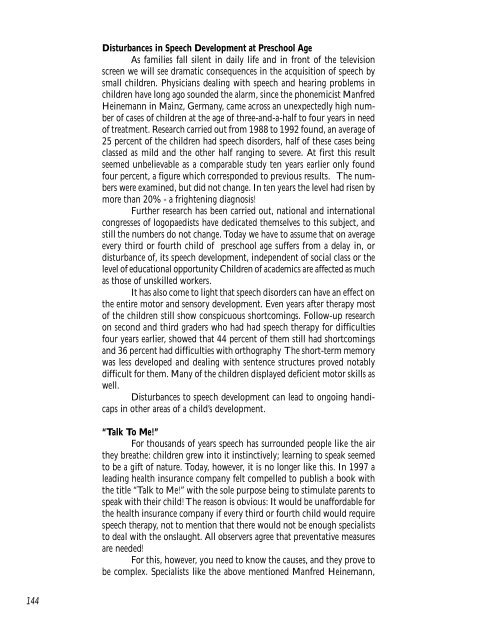Colloquium on English - Research Institute for Waldorf Education
Colloquium on English - Research Institute for Waldorf Education
Colloquium on English - Research Institute for Waldorf Education
You also want an ePaper? Increase the reach of your titles
YUMPU automatically turns print PDFs into web optimized ePapers that Google loves.
144<br />
Disturbances in Speech Development at Preschool Age<br />
As families fall silent in daily life and in fr<strong>on</strong>t of the televisi<strong>on</strong><br />
screen we will see dramatic c<strong>on</strong>sequences in the acquisiti<strong>on</strong> of speech by<br />
small children. Physicians dealing with speech and hearing problems in<br />
children have l<strong>on</strong>g ago sounded the alarm, since the ph<strong>on</strong>emicist Manfred<br />
Heinemann in Mainz, Germany, came across an unexpectedly high number<br />
of cases of children at the age of three-and-a-half to four years in need<br />
of treatment. <strong>Research</strong> carried out from 1988 to 1992 found, an average of<br />
25 percent of the children had speech disorders, half of these cases being<br />
classed as mild and the other half ranging to severe. At first this result<br />
seemed unbelievable as a comparable study ten years earlier <strong>on</strong>ly found<br />
four percent, a figure which corresp<strong>on</strong>ded to previous results. The numbers<br />
were examined, but did not change. In ten years the level had risen by<br />
more than 20% - a frightening diagnosis!<br />
Further research has been carried out, nati<strong>on</strong>al and internati<strong>on</strong>al<br />
c<strong>on</strong>gresses of logopaedists have dedicated themselves to this subject, and<br />
still the numbers do not change. Today we have to assume that <strong>on</strong> average<br />
every third or fourth child of preschool age suffers from a delay in, or<br />
disturbance of, its speech development, independent of social class or the<br />
level of educati<strong>on</strong>al opportunity Children of academics are affected as much<br />
as those of unskilled workers.<br />
It has also come to light that speech disorders can have an effect <strong>on</strong><br />
the entire motor and sensory development. Even years after therapy most<br />
of the children still show c<strong>on</strong>spicuous shortcomings. Follow-up research<br />
<strong>on</strong> sec<strong>on</strong>d and third graders who had had speech therapy <strong>for</strong> difficulties<br />
four years earlier, showed that 44 percent of them still had shortcomings<br />
and 36 percent had difficulties with orthography The short-term memory<br />
was less developed and dealing with sentence structures proved notably<br />
difficult <strong>for</strong> them. Many of the children displayed deficient motor skills as<br />
well.<br />
Disturbances to speech development can lead to <strong>on</strong>going handicaps<br />
in other areas of a child’s development.<br />
“Talk To Me!”<br />
For thousands of years speech has surrounded people like the air<br />
they breathe: children grew into it instinctively; learning to speak seemed<br />
to be a gift of nature. Today, however, it is no l<strong>on</strong>ger like this. In 1997 a<br />
leading health insurance company felt compelled to publish a book with<br />
the title “Talk to Me!” with the sole purpose being to stimulate parents to<br />
speak with their child! The reas<strong>on</strong> is obvious: It would be unaf<strong>for</strong>dable <strong>for</strong><br />
the health insurance company if every third or fourth child would require<br />
speech therapy, not to menti<strong>on</strong> that there would not be enough specialists<br />
to deal with the <strong>on</strong>slaught. All observers agree that preventative measures<br />
are needed!<br />
For this, however, you need to know the causes, and they prove to<br />
be complex. Specialists like the above menti<strong>on</strong>ed Manfred Heinemann,

















